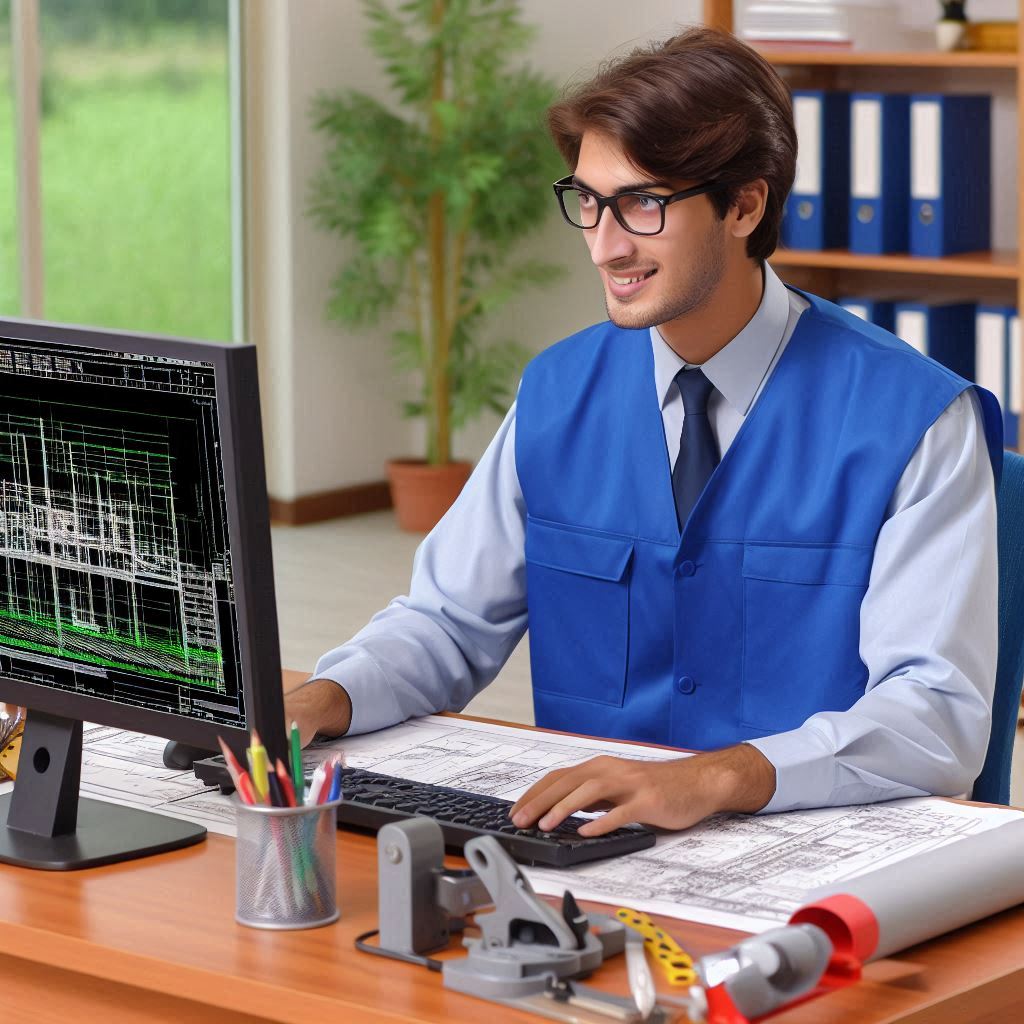Introduction
CAD technicians are indispensable across various industries, including architecture, engineering, and manufacturing.
They translate design concepts into detailed technical drawings and models, crucial for project success.
As technology advances rapidly, the need for skilled CAD technicians grows.
Their ability to work with cutting-edge software and adapt to new tools is increasingly important.
CAD technicians must master several essential skills to stay relevant.
Proficiency in CAD software is fundamental.
Technicians need to be comfortable with industry-standard programs like AutoCAD, SolidWorks, or Fusion 360.
These tools are central to creating accurate and detailed designs.
Attention to detail is another critical skill.
Technicians must ensure that every aspect of a design is precise and conforms to technical standards.
Even minor errors can lead to significant issues in the final product or structure.
Problem-solving abilities are also essential.
CAD technicians often encounter design challenges that require creative and practical solutions.
They must analyze issues and adjust designs accordingly to meet project requirements and constraints.
A solid understanding of technical drawing standards and materials is necessary.
CAD technicians should be familiar with various drawing conventions and the properties of different materials.
This knowledge helps in creating designs that are both functional and manufacturable.
Technical Proficiency
Proficiency in CAD Software Such as AutoCAD, SolidWorks, or Revit
Proficiency in CAD software is a fundamental skill for CAD technicians.
Mastering programs like AutoCAD, SolidWorks, or Revit is essential.
AutoCAD is widely used for 2D drafting and basic 3D modeling.
SolidWorks excels in 3D modeling and simulation, often used in engineering.
Revit specializes in building information modeling (BIM) for architectural projects.
Technicians must be comfortable navigating these tools to create accurate and detailed designs.
Proficiency includes knowing how to use advanced features, shortcuts, and customization options.
Technicians should stay updated on software updates and new tools to enhance their productivity.
Ability to Create 2D and 3D Drawings Accurately and Efficiently
Creating accurate and efficient 2D and 3D drawings is a critical skill for CAD technicians.
In 2D drafting, technicians develop floor plans, elevations, and sections.
Precision in dimensions, scales, and annotations ensures the drawings’ accuracy.
In 3D modeling, technicians create detailed models that represent physical objects.
They use tools for extrusion, rotation, and scaling to build complex shapes.
Efficient use of software tools and techniques speeds up the design process.
CAD technicians must also ensure that the drawings are correctly formatted and compatible with other software or systems.
Understanding of Design Principles and Engineering Concepts
A solid understanding of design principles and engineering concepts is essential for CAD technicians.
Technicians must grasp fundamental principles such as geometry, spatial relationships, and material properties.
Knowledge of engineering concepts like load distribution, structural integrity, and functionality informs their design work.
This understanding helps technicians create designs that are not only visually accurate but also feasible and practical.
They need to integrate design aesthetics with engineering requirements to produce effective solutions.
Familiarity with industry-specific standards and practices ensures that designs meet both functional and regulatory needs.
Generally, CAD technicians must excel in using software tools like AutoCAD, SolidWorks, or Revit.
They need to create 2D and 3D drawings with precision and efficiency.
A thorough understanding of design principles and engineering concepts is also crucial.
Mastery of these skills ensures that CAD technicians can produce accurate, functional, and industry-compliant designs.
These competencies are vital for successful careers in various fields, including engineering, architecture, and manufacturing.
Attention to detail
Importance of Precision and Accuracy in CAD Drawings
Precision and accuracy are crucial for CAD technicians.
Every CAD drawing must reflect exact measurements and specifications.
Small errors in drawings can lead to significant issues in the final product.
Technicians must ensure that all dimensions and details are meticulously entered.
Precision is particularly important in fields like engineering, architecture, and manufacturing, where even minor inaccuracies can impact functionality or safety.
Accuracy in CAD work ensures that designs are reproducible and reliable.
It helps in avoiding costly revisions and ensures that the final product matches the original design intent.
Ability to Identify Errors and Make Necessary Corrections
The ability to identify and correct errors is a vital skill for CAD technicians.
Drawings often contain mistakes or inconsistencies that need addressing before finalization.
Technicians should have a keen eye for detail to spot discrepancies in dimensions, annotations, or layer arrangements.
Correcting errors promptly prevents the propagation of mistakes through the design process.
It also helps maintain the quality and integrity of the final design.
CAD software often includes tools for detecting errors, but technicians must actively review their work.
Regular checks and validations are essential to ensure that the drawings are error-free.
Ensuring That Drawings Meet Industry Standards and Regulations
Ensuring that CAD drawings comply with industry standards and regulations is a fundamental responsibility.
Different industries have specific guidelines and requirements that drawings must meet.
CAD technicians must be familiar with these standards, such as ISO, ANSI, or local regulations.
Compliance ensures that designs are safe, functional, and acceptable for production or construction.
Technicians should regularly review industry standards to stay updated on any changes.
Adhering to these standards not only supports quality control but also avoids legal and operational issues.
It guarantees that the designs will be properly interpreted and implemented in real-world applications.
Therefore, precision and accuracy in CAD drawings are essential for creating reliable designs.
CAD technicians must be skilled in identifying and correcting errors to maintain high-quality work.
Ensuring compliance with industry standards and regulations is also crucial for the successful implementation of designs.
Mastering these skills will lead to more effective and efficient design processes, contributing to the overall success of engineering, architectural, or manufacturing projects.
Problem-solving skills
Ability to Analyze Complex Design Problems and Come Up with Creative Solutions
CAD technicians often face complex design problems that require innovative solutions.
They must analyze intricate details of designs to identify potential issues.
This involves breaking down complex systems into manageable components to understand how they interact.
Technicians use their analytical skills to pinpoint the root causes of design problems.
They then apply creative thinking to devise effective solutions that address these issues.
Creativity in design ensures that the final product meets both functional and aesthetic requirements.
Technicians must also explore alternative approaches to enhance design efficiency and performance.
They need to adapt and innovate, as each project may present unique challenges.
Effective problem-solving in CAD design involves combining technical expertise with creative insight to deliver optimal solutions.
Critical Thinking Skills to Troubleshoot Issues in CAD Software
Critical thinking is crucial for troubleshooting issues in CAD software.
Technicians frequently encounter software glitches, design errors, or compatibility issues.
They must use logical reasoning to diagnose these problems and find solutions.
This process often involves examining error messages, reviewing design parameters, and checking software settings.
Technicians need to systematically test different solutions to identify the cause of the issue.
They also benefit from understanding the software’s underlying algorithms and functions.
This knowledge helps them predict and resolve issues more efficiently.
Staying current with software updates and patches is important for minimizing technical problems.
Critical thinking skills enable technicians to address software challenges proactively and ensure smooth operation.
Collaborating with Engineers and Designers to Solve Design Challenges
Collaboration with engineers and designers is essential for solving design challenges.
CAD technicians work closely with these professionals to ensure that design specifications are met.
Effective communication is key to understanding their needs and incorporating their feedback into the design.
Technicians must be able to interpret and implement complex instructions and revisions.
They also provide valuable insights and suggestions based on their technical expertise.
By collaborating, technicians and engineers can identify potential design flaws early and address them before finalizing the project.
This teamwork ensures that the design is both practical and innovative.
Regular meetings and updates help keep all team members aligned and informed throughout the design process.
CAD technicians must develop several essential skills to succeed in their roles.
They need the ability to analyze complex design problems and come up with creative solutions.
Critical thinking skills are crucial for troubleshooting issues in CAD software.
Collaboration with engineers and designers helps address design challenges effectively.
Mastering these skills ensures that CAD technicians can deliver high-quality designs and contribute to successful project outcomes.
Read: The Future of Environmental Engineering Jobs
Communication skills
Effective Communication with Team Members, Clients, and Stakeholders
Effective communication is vital for CAD technicians working on design projects.
Technicians must interact regularly with team members, clients, and stakeholders.
Clear communication ensures that all parties understand the project goals and requirements.
CAD technicians must articulate technical details and design concepts in an understandable manner.
Regular updates and feedback sessions help keep everyone informed and aligned.
Effective communication fosters collaboration and minimizes misunderstandings, leading to more successful project outcomes.
Building strong relationships through clear and respectful communication also enhances teamwork and client satisfaction.
By prioritizing effective communication, CAD technicians contribute to smoother project execution and better overall results.
Presenting CAD Drawings and Designs in a Clear and Concise Manner
Presenting CAD drawings and designs clearly and concisely is essential for conveying ideas effectively.
CAD technicians must ensure that their drawings are easy to interpret and visually appealing.
Use standardized symbols, labels, and dimensions to enhance clarity.
Proper organization of drawings and adherence to formatting guidelines prevent confusion.
When presenting designs, focus on highlighting key elements and avoiding unnecessary details.
Effective presentations often include annotations and explanations to provide context.
Clear and concise presentations help clients and stakeholders understand the design intent and make informed decisions.
By refining presentation skills, CAD technicians improve communication and support successful project reviews and approvals.
Asking Questions to Clarify Project Requirements and Expectations
Asking questions is crucial for clarifying project requirements and expectations.
CAD technicians must seek clarification when project details are unclear or incomplete.
Questions help in understanding client needs and project specifications more accurately.
Probing for additional information ensures that designs meet all requirements and constraints.
This proactive approach helps in identifying potential issues early and prevents costly revisions later.
Regularly engaging with clients and stakeholders to clarify expectations leads to better alignment and satisfaction.
Asking relevant questions demonstrates thoroughness and commitment to delivering high-quality work.
By being inquisitive and detail-oriented, CAD technicians ensure that their designs fulfill project objectives effectively.
Therefore, effective communication with team members, clients, and stakeholders is fundamental for CAD technicians.
Presenting CAD drawings and designs clearly and concisely enhances understanding and project success.
Asking questions to clarify requirements and expectations ensures that designs meet all necessary criteria.
These essential skills contribute to improved project outcomes, better client relationships, and successful design execution.
By mastering these skills, CAD technicians enhance their effectiveness and contribute positively to their projects and professional growth.
Read: Environmental Engineering and Corporate Social Responsibility

Time management
Ability to Work Under Tight Deadlines and Prioritize Tasks
As a CAD technician, the ability to work under tight deadlines is crucial.
Projects often have strict schedules, requiring efficient time management.
Prioritizing tasks effectively ensures that critical components are completed first.
This involves assessing the urgency and importance of each task and allocating time accordingly.
Being adaptable and organized helps in handling unexpected changes or urgent requests.
Develop strategies to manage stress and maintain productivity when faced with tight deadlines.
Balancing speed and accuracy is essential, as rushed work can lead to errors.
By staying focused and managing your time wisely, you can meet project deadlines and deliver high-quality work.
Efficiently Managing Multiple Projects Simultaneously
Managing multiple projects simultaneously is a common responsibility for CAD technicians.
Efficient management involves tracking the progress of each project and ensuring timely completion.
Use project management tools to organize tasks, set deadlines, and monitor progress.
Prioritize projects based on their deadlines and complexity, allocating resources effectively.
Clear communication with team members and clients helps in coordinating efforts and avoiding misunderstandings.
Break larger projects into smaller, manageable tasks to streamline workflows and make progress more visible.
Regularly review and adjust your schedule to accommodate changes or new tasks.
By maintaining organization and clear communication, you can handle multiple projects efficiently and meet all deadlines.
Meeting Project Milestones and Deliverables on Time
Meeting project milestones and deliverables on time is critical for success as a CAD technician.
Milestones are key points in a project that signify progress and achievements.
Set clear goals and deadlines for each milestone to ensure timely completion.
Regularly review project timelines and adjust your workflow to stay on track.
Collaborate with team members to address any issues that may affect deliverables.
Monitor the quality of your work to ensure it meets project specifications and standards.
Providing regular updates to stakeholders helps in managing expectations and ensuring alignment with project goals.
By focusing on milestones and deliverables, you contribute to the overall success of the project and maintain client satisfaction.
In essence, working under tight deadlines requires effective prioritization and time management.
Managing multiple projects simultaneously demands organizational skills and clear communication.
Meeting project milestones and deliverables on time involves setting goals, monitoring progress, and ensuring high-quality work.
Mastering these skills ensures that you can handle the demands of a CAD technician role effectively and contribute to successful project outcomes.
Read: Environmental Engineering Software and Tools
Adaptability
Flexibility to Learn New CAD Software and Techniques
In the rapidly evolving field of CAD, flexibility is crucial.
CAD technicians must be willing to learn new software and techniques as technology advances.
New CAD tools and features are regularly introduced, enhancing design capabilities and efficiency.
Being adaptable allows technicians to stay competitive and effective in their roles.
Embracing new software often involves learning different interfaces and functionalities, which requires an open mind and a proactive attitude.
Technicians should actively seek out tutorials, webinars, and practice exercises to become proficient in emerging technologies.
This adaptability not only improves their current job performance but also prepares them for future advancements in the field.
Transform Your Career Today
Unlock a personalized career strategy that drives real results. Get tailored advice and a roadmap designed just for you.
Start NowAdjusting to Changes in Project Requirements or Design Specifications
CAD technicians frequently encounter changes in project requirements or design specifications.
The ability to adjust quickly and accurately is essential.
Projects often evolve due to client feedback, new regulations, or unforeseen challenges.
Technicians must modify their designs and documentation to reflect these changes promptly.
This skill involves re-evaluating designs, making adjustments, and ensuring that all updates are accurately incorporated into the final product.
Effective change management also requires clear communication with team members and stakeholders to ensure everyone is aligned with the revised specifications.
Being adaptable to change helps maintain project timelines and quality standards.
Willingness to Seek Continuing Education and Training Opportunities
A commitment to continuing education and training is vital for CAD technicians.
As technology and industry standards progress, ongoing learning is necessary to stay current.
Technicians should pursue certifications, attend workshops, and enroll in advanced courses to deepen their expertise.
Continuing education helps them master new CAD software, understand emerging trends, and refine their skills.
Many industry associations and educational institutions offer specialized training programs that can enhance a technician’s qualifications and career prospects.
By staying informed and up-to-date, technicians can adapt to new challenges and seize opportunities for career advancement.
To succeed as a CAD technician, flexibility in learning new software and techniques is crucial.
Technicians must adjust to changes in project requirements and design specifications efficiently.
A willingness to pursue continuing education and training further supports their growth and adaptability.
Embracing these skills ensures that CAD technicians remain relevant and effective in a dynamic industry.
By continuously updating their knowledge and skills, technicians can enhance their performance and advance their careers.
Read: Public Health and Environmental Engineering
Attention to industry trends
Staying Updated on the Latest Advancements in CAD Technology
Staying updated on the latest advancements in CAD technology is crucial for CAD technicians.
CAD software evolves rapidly, introducing new features and tools.
Regularly exploring updates and new releases keeps technicians at the forefront of their field.
Engaging with online forums, professional groups, and software newsletters can provide insights into the latest developments.
Training programs and webinars offer opportunities to learn about new functionalities and techniques.
Technicians should also review industry publications to stay informed about technological trends.
Embracing these advancements can improve efficiency and enhance the quality of design work.
Understanding How Emerging Technologies Impact CAD Design
Understanding how emerging technologies impact CAD design is essential for staying relevant in the industry.
Technologies like 3D printing, virtual reality, and artificial intelligence are reshaping design processes.
CAD technicians must learn how these technologies integrate with CAD systems.
For example, 3D printing requires precise design models for accurate production.
Virtual reality can be used to visualize and interact with designs in a simulated environment.
Artificial intelligence tools can automate repetitive tasks and suggest design improvements.
By understanding these impacts, technicians can adapt their skills and workflows to leverage new technologies effectively.
Implementing Best Practices to Stay Competitive in the Industry
Implementing best practices is key to staying competitive in the CAD industry.
Following industry standards and guidelines ensures high-quality and reliable designs.
Using version control systems helps manage and track changes in design files.
Adopting efficient file organization and naming conventions improves project management and collaboration.
Technicians should also focus on continuous learning and skill development.
Pursuing certifications or advanced training in new CAD tools and techniques can enhance expertise.
Networking with other professionals and participating in industry events can provide valuable insights and opportunities.
Staying proactive and adaptable will help maintain a competitive edge in a rapidly evolving field.
In summary, staying updated on CAD technology advancements, understanding the impact of emerging technologies, and implementing best practices are essential for CAD technicians.
By continuously learning and adapting to new developments, technicians ensure their skills remain relevant and effective.
Embracing new technologies and refining work practices will enhance design quality and maintain competitiveness in the CAD industry.
Conclusion
CAD technicians play a crucial role in various industries by assisting in the design and development of products.
They are essential for ensuring accuracy and efficiency in the creation of technical drawings and models.
Having a combination of technical skills, problem-solving abilities, communication skills, and adaptability is paramount for CAD technicians to thrive in their careers.
These skills enable them to effectively collaborate with team members, interpret project requirements, and solve complex design challenges.
Aspiring CAD technicians are encouraged to continuously develop and enhance their skills to stay competitive in the ever-evolving field of computer-aided design.
By staying updated on the latest software tools and industry trends, they can position themselves for success and advancement in their careers.
It is essential for CAD technicians to be adaptable and open to learning new techniques to meet the demands of their diverse roles in various industries.
By honing their technical skills, problem-solving abilities, communication skills, and adaptability, CAD technicians can excel in their careers and make significant contributions to the design and engineering processes of different projects.
Their expertise is highly valued in industries such as architecture, engineering, manufacturing, and construction, where precision and accuracy are vital for project success.
[E-Books for Sale]
The Big Book of 500 High-Paying Jobs in America: Unlock Your Earning Potential
$19.99 • 500 High-Paying Jobs • 330 pages
Explore 500 high-paying jobs in America and learn how to boost your career, earn more, and achieve success!
See All 500 High-Paying Jobs of this E-Book
1001 Professions Without a Degree: High-Paying American Jobs You Can Start Now
$19.99 • 1001 Professions Without a Degree • 174 pages
Discover 1001 high-paying jobs without a degree! Unlock career tips, skills, and success strategies for just $19.99!




